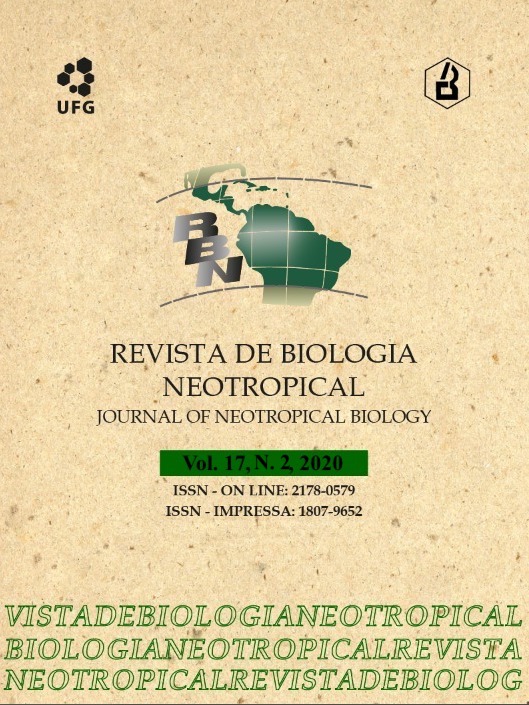Weight determines the outcome in territorial contests of Erythrodiplax fusca Rambur, 1842 (Odonata: Libellulidae)
DOI:
https://doi.org/10.5216/rbn.v17i2.63511Keywords:
Conflict, weight, RHP, contests and territoryAbstract
Erythrodiplax fusca (Rambur, 1842) is an Odonata of the Libellulidae family, which defend their territories close to rivers, lakes and swamps. Disputes over access to females or breeding sites usually occur during flight activities. The objective in this work was to analyze the disputes over territories between males and to evaluate if the winners are heavier than losers. The study was conducted at the Morro Feio Experimental Farm, located in the municipality of Hidrolândia, state of Goiás, Brazil. First, an inspection was carried out to find points on the bank of the stream that males commonly dispute to establish their territories. After the identification of these points, all disputes for territory were counted and at the end of the conflict the two males were collected (winner and loser) and weighed. 74 individuals of E. fusca (37 winners and 37 losers) were collected. The fresh weight was decisive to win the dispute, with winner males 10% heavier than losing males. Therefore, this work corroborates the hypothesis that the weight of the males of E. fusca is related to increases in probability of victory in disputes over territories.
Downloads
References
Arnott, G. & R. W. Elwood. 2009. Assessment of fighting ability in animal contests. Anim. Behav. 77: 991-1004. DOI: https://doi.org/10.1016/j.anbehav.2009.02.010
Borror. D. 1942. A revision of the Libelluline Genus Erythrodiplax (Odonata), Ohio, Ohio State University.
Briffa, M. & I. C. W. Hardy. 2013. Introduction to animal contests. pp. 1-4. In: Hardy, I. C. W. & M. Briffa. Animal Contests. New York, Cambridge University press.
Corbet, P. S. 1980. Biology of Odonata. Annu. Rev. Entomol. 25: 189-217. DOI: https://doi.org/10.1146/annurev.en.25.010180.001201
De Marco, P., A. O. Latini, & D. C. Resende. 2005. Thermoregulatory constraints on behavior: patterns in a neotropical dragonfly assemblage. Neotrop. Entomol. 34: 155-162. DOI: https://doi.org/10.1590/S1519-566X2005000200002
De Marco. P. & D. C. Resende. 2002. Activity patterns and thermoregulation in a tropical dragonfly assemblage. Odonatologica. 31: 129-139.
Draud, M. & P. A. E. Lynch. 2002. Asymmetric contests for breeding sites between monogamous pairs of convict cichlids (Archocentrus nigrofasciatum, Cichlidae): pair experience pays. Anim. Behav. 139: 861-873.
Elias, D. O., M. M. Kasumovic, D. Punzalan, M. C. B. Andrade & A. C. Mason. 2008. Assessment during aggressive contests between male jumping spiders. Anim. Behav. 76: 901–910.
Forsyth, A. & R. D. Montgomerie. 1987. Alternative reproductive tactics in the territorial damselfly Calopteryx maculata: sneaking by older males. Behav. Ecol. Sociobiol. 21: 73-81. DOI: https://doi.org/10.1007/BF02395434
Junior, R. S. L. & P. E. C. Peixoto. 2013. Males of the dragonfly Diastatops obscura fight according to predictions from game theory models. Anim. Behav. 85: 663-669. DOI: https://doi.org/10.1016/j.anbehav.2012.12.033
Kelly, C. D. 2006. Fighting for harems: assessment strategies during male–male contests in the sexually dimorphic Wellington tree weta. Anim. Behav. 72: 727–736.
Klink, C. A. & R. Machado. 2005. A conservação do Cerrado brasileiro. Megadiversidade. 1: 147-155.
Lefevre, K. L. & V. R. Muehter. 2004. Competition for mating resources in a territorial damselfly (Odonata: Calopterygidae). Stud. Neotrop. Fauna Environ. 39: 159-165.
Parker, G.A. 1974. Assessment strategy and the evolution of fighting behaviour. J. Theor. Biol. 47: 223-243. DOI: https://doi.org/10.1016/0022-5193(74)90111-8
Peixoto, P. E. C. & W. M. Benson. 2008. Body Mass and not Wing Length Predicts Territorial Success in a Tropical Satyrine Butterfly. Ethology. 114: 1069–1077. DOI: https://doi.org/10.1111/j.1439-0310.2008.01555.x
Pinto, N. S., J. Hidasi-Neto, V. Ribeiro, A. R. Rodrigues, B. R. Brandão & C. O. Rocha. 2013. Efeito da Presença de Vizinhos sobre o Comportamento Territorial de Perithemis mooma (Kirby) (Anisoptera: Libellulidae). EntomoBrasilis. 6: 104-107. DOI: https://doi.org/10.12741/ebrasilis.v6i2.285
R Development Core Team. 2015. R: A Language and Environment for Statistical Computing. R Foundation for Statistical Computing, Vienna Electronic file available at http://www.R-project.org.
Resende, D. C. 2010. Residence advantage in heterospecific territorial disputes of Erythrodiplax Brauer species (Odonata, Libellulidae). Rev. Bras. Entomol. 54: 110-114. DOI: https://doi.org/10.1590/S0085-56262010000100014
Resende, D. & P. De Marco. 2008. Residence and territorial characteristics of Libellulidae species in a neotropical assemblage (Anisoptera). Odonatologica. 37: 213-220.
Riechert, S. E. 1978. Games spiders play: behavioral variability in territorial disputes. Behav. Ecol. Sociobiol. 3: 135–162. DOI: https://doi.org/10.1007/BF00294986
Switzer, P. V. 2004. Fighting behavior and prior residency advantage in the territorial dragonfly, Perithemis tenera. Ethol. Ecol. Evol. 16: 71-89. DOI: https://doi.org/10.1080/08927014.2004.9522655
Vieira, M. C. & P. E. C. Peixoto. 2013. Winners and losers: a meta-analysis of functional determinants of fighting ability in arthropod contests. Func. Ecol. 27: 305–313. DOI: https://doi.org/10.1111/1365-2435.12051
Downloads
Published
How to Cite
Issue
Section
License
The expontaneos submmition of the manuscript automaticaly implies in the cession of all patrimonial rights for the Journal of Neotropical Bilogy (RBN) after publication. The autor allow the right of first publication of the article to the RBN, under Creative Commons Attribution 4.0 (CC BY-NC 4.0) Licence.
There are garanties for the authors to the authorial and moral rights, for each one of the articles published by RBN, with permissions:
1. The use of article and contents for the education and researches.
2. The use of the article and their contents, linking to the Article on the web site of the RBN, allowing the divulgation on:
- institutional closed web (intranet).
- open access repositories.
3. Preparation and divulgation of the other publication derived from the article and its content, if there is citation of the original publication by RBN.
4. Make printed copies in small quatinties for personal use.

















